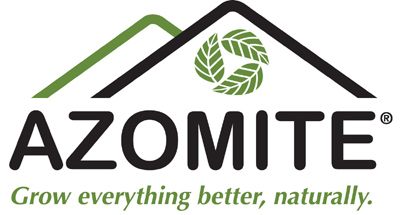
*Due to market volatility, prices are subject to change without notice.
Containing a broad spectrum of over 70 metabolically active minerals and trace elements, OMRI listed Azomite is a simple to use, natural mined mineral product. It requires no mixing or special equipment. It is odorless and won't restrict aeration or water penetration. It is 100% natural with no additives or fillers.
{tab Formulation}
Azomite trace mineral fertilizer is a complex of naturally occurring minerals which contains essential elements (micro-nutrients) for plant growth. Fertilization with Azomite adds some of the required mineral balance for the growth of common soil flora and fauna vital to overall productivity. Continuous plant propagation and the leaching effects of water may deplete essential minerals and micro-nutrients from soils. Azomite can improve soils that have been depleted of these important minerals and micronutrients. It can also supplement soil that are inherently deficient of these vital mineral concentrations.
{tab Applications}
As a direct soil amendment;
Spread at the rate of 300 to 600 pounds per acre and either lightly disked into the soil surface of applied in the row when planting. For gardens, spread ¼ to 2 pounds per 10 ft2 and spade into the soil. Use 1 teaspoon or 1 cup in watering can quarterly for house plants.
As an animal nutritional;
In feed rations, 1-2 percent (do not exceed 2 percent) of the feed mixture and mix thoroughly with feed. Azomite is a natural source of trace elements for both animals and the soil. It is a hydrated sodium calcium aluminosilicate derived from a natural volcanic mineral deposit.
Click here to view application rate sheet
{tab Compost Tea}
We suggest adding approximately one pound of Azomite to a one gallon pail of compost to aid in pre-activation. Azomite can be added to your compost tea brew at the beginning of the cycle at 4-6 ounces per 50 gallons.
{tab Trace Minerals}
Azomite contains the following essential elements;
Boron (B) - It helps move sugars from cell to cell; control starch formation; stimulates cell division, flower formation and pollination.
Calcium (Ca) - Raw material for holding cell walls; raises pH; aids genetic stability; promotes root hair formation and earth; stiffens straw.
Chlorine (Cl) - Needed for photosynthesis; stimulates root growth and aids water movement in plants.
Cobalt (Co) - Needed by Rhizobium for nitrogen fixation; helps form vitamin B12; improves growth, water movement and photosynthesis; improves growth, water movement and photosynthesis; improves boll production in cotton; activates certain enzymes.
Copper (Cu) - Enzyme activator, particularly for certain protein forming enzymes and Vitamin A forming enzymes; it stimulated stem development and pigment formation.
Iron (Fe) - Raw material for several enzymes including those that form chlorophyll and those that help oxidize (burn) sugar for energy; also necessary for legume nitrogen fixation.
Magnesium (Mg) - Raw material for chlorophyll formation; activates enzymes particularly those involved with nitrogen reactions and energy metabolism; it increases oil production
in flax and soybeans; helps regulate uptake of other elements.
Molybdenum (Mo) - Needed for nitrogen fixation and nitrogen use in the plant; specifically it is needed to make amino acids; it stimulates plant growth and vigor very much like nitrogen.
Nitrogen (N) - Raw material for proteins, chlorophyll, and genetic material (DNA and RNA); stimulates vegetative growth.
Phosphorous (P) - Raw material of genetic material (DNA and RNA) and for energy carrying compounds (ATP and ADP); stimulates fruit, seed and root production and early season growth; increases winter hardiness.
Potassium (K) - Necessary for sugar movement from leaves to developing fruits and seeds and for starch formation. It helps water movement; stimulates fruit, seed and root production and increases disease resistance; increases red pigment in fruits.
Silicon (Si) - Increases the number of seeds (particularly in rice and other grains); increases sugar cane growth.
Sodium (Na) Necessary for proper carbohydrate production and use; increases resistance to drought; increases sugar content in some crops (sugar beets).
Sulfur (S) Raw material for certain amino acids and thus for proteins; necessary for legume nodule formation; raw material for certain oil compounds that give specific odors to some plants such as onions, garlic, mustard, etc; it is also a raw material for certain protein forming enzymes; it increases oil production in flax and soybeans.
Zinc (Zn) Raw materials for several enzymes including those that form growth controlling substances; stimulates stem growth and flower bud formation.
{tab Analysis}

Click here to view certificate of analysis
{/tabs}